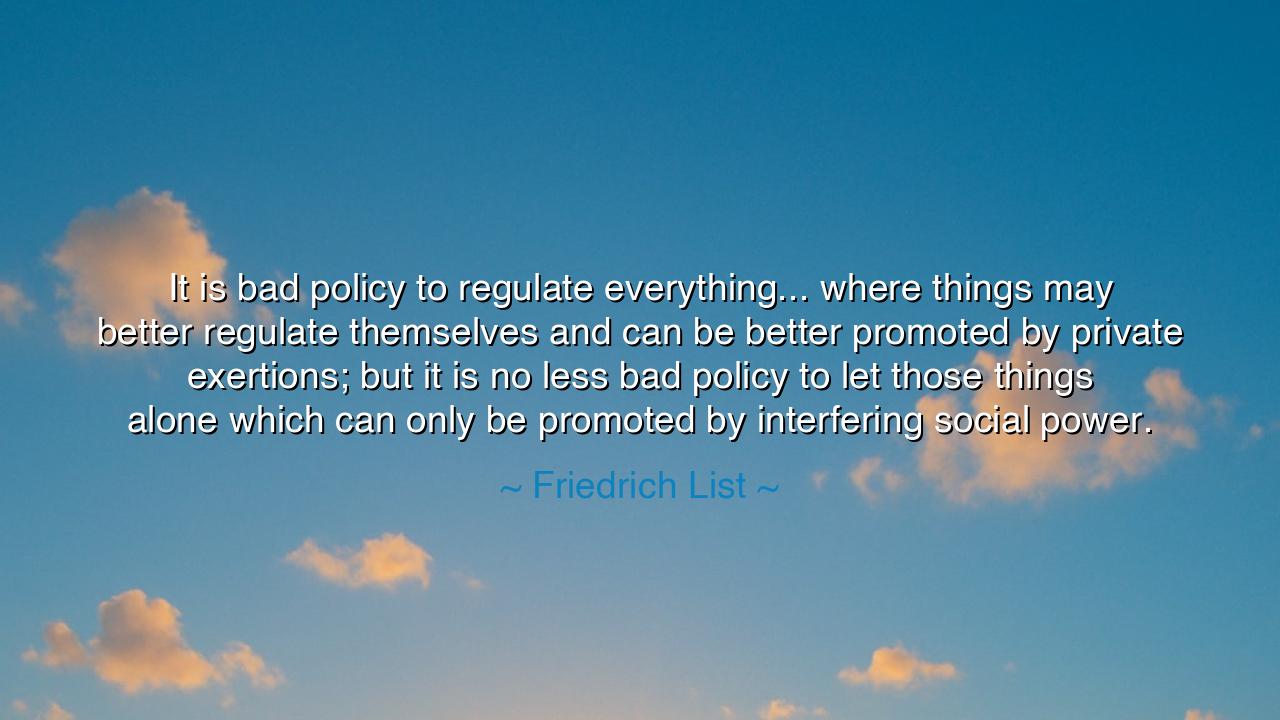
It is bad policy to regulate everything... where things may
It is bad policy to regulate everything... where things may better regulate themselves and can be better promoted by private exertions; but it is no less bad policy to let those things alone which can only be promoted by interfering social power.






"It is bad policy to regulate everything... where things may better regulate themselves and can be better promoted by private exertions; but it is no less bad policy to let those things alone which can only be promoted by interfering social power." Thus spoke Friedrich List, the German economist and philosopher, a man whose mind burned with the desire to reconcile freedom with order, and progress with wisdom. His words, though spoken in the 19th century, ring with the ageless music of balance — a reminder that governance is neither the art of domination nor of neglect, but the delicate harmony between liberty and responsibility.
List was a thinker forged in the furnace of national struggle. He lived at a time when Germany was not yet a nation, but a patchwork of principalities, lagging behind the industrial might of Britain. He saw that economic power was the foundation of political independence, and that unrestrained laissez-faire — the blind faith that all things should be left to the free market — would doom weaker nations to perpetual dependency. Yet, neither did he believe in the smothering grasp of total regulation. His words here are not a call for control, but for discernment: to regulate only where necessary, and to trust private exertion — human industry, creativity, and enterprise — where it naturally thrives.
In the first part of his saying, List warns against the arrogance of overregulation — the belief that the state must command every motion of society, from the smallest trade to the grandest invention. Such interference, he knew, stifles the spirit of initiative and dulls the edge of innovation. Just as a tree grows crooked when forced by too many hands, so too does a society lose its vitality when bound by needless rules. In the natural order of things, there are forces — competition, cooperation, and self-interest guided by virtue — that can govern themselves better than any ministry or decree. It is bad policy, he says, to meddle where freedom does the work more perfectly.
Yet, in the same breath, List turns his wisdom upon the opposite error — the folly of neglect. For if overregulation kills initiative, underregulation kills justice. There are tasks, he insists, that only the collective strength of society — the interfering social power — can perform. Education, infrastructure, national defense, and the nurturing of new industries cannot be left to chance or charity alone. A wise government must sometimes act as a gardener, cultivating what the soil of individual effort cannot yet sustain. In this, List diverged from the pure disciples of Adam Smith, proclaiming that economic freedom without national purpose is but an empty promise. The market may be efficient, but it is not moral; it must be guided by the higher aims of civilization.
History has proven the truth of his insight. In 19th-century Britain, the Industrial Revolution brought wealth to some but misery to many, for the government believed too strongly in the invisible hand of the market. Children toiled in factories, the poor starved in slums, and the streets grew foul with the smoke of unchecked progress. Yet in Meiji Japan, the opposite approach prevailed: the state wisely nurtured its infant industries, investing in education, shipbuilding, and technology. By the next century, Japan had risen from feudal isolation to modern power. There, the interfering social power acted not as a tyrant, but as a midwife to national prosperity — proving that freedom and intervention, wisely balanced, can create greatness.
The meaning of List’s wisdom, then, is that both extremes — the worship of control and the worship of chaos — are equally destructive. The art of governance lies not in choosing one over the other, but in discerning when to act and when to refrain. A good ruler, like a skilled physician, knows that not every ailment needs medicine, but some illnesses demand it. Regulate where the common good requires collective strength; refrain where liberty can do the work of law. For both freedom and authority are sacred, but each becomes dangerous when unrestrained.
The lesson is as timeless as the civilizations that have risen and fallen by it: wisdom is balance. In the household, in the market, in the state — let there be both freedom and guidance, both self-reliance and solidarity. Do not demand that government solve every problem, nor believe that society can flourish without it. Be strong in your private exertions, yet mindful of your social duty. For every person, like every nation, must learn this harmony within themselves — when to let the heart lead, and when to submit to reason.
So remember the wisdom of Friedrich List, the prophet of balance in an age of extremes: that bad policy lies not in action or inaction alone, but in ignorance of their proper measure. Let the people act where freedom breeds virtue, and let the social power intervene where justice demands its hand. For only when liberty and responsibility walk together can a nation prosper — free in its spirit, but united in its purpose.






AAdministratorAdministrator
Welcome, honored guests. Please leave a comment, we will respond soon